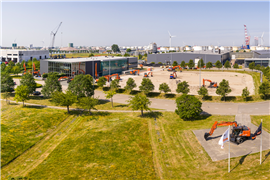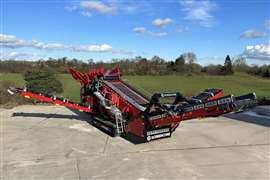Why demolition contractors are choosing modular crushing and screening systems
08 August 2025
As the industry demands more adaptable crushing, screening and wet processing systems, D&Ri explores how manufacturers are responding.
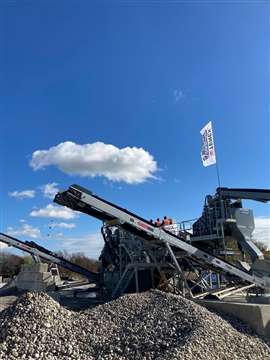 The AggWash 60 is a single containerised unit that is designed for easy setup and transport. Photo: Terex Washing Systems
The AggWash 60 is a single containerised unit that is designed for easy setup and transport. Photo: Terex Washing Systems
Changing regulations, tighter site footprints, and growing demand for higher-quality recycled materials are putting new pressure on demolition contractors to rethink how they process C&D waste.
Where the industry once favoured simple, robust setups to handle concrete, brick and asphalt in bulk, the needs of 2025 are different: contractors and recyclers now want systems that can adapt to the site, the material, and the end market.
That shift has led to a growing focus on flexibility – both in equipment layout and in how screening, crushing, and washing systems can be configured, modified, or scaled depending on the conditions at hand.
At Bauma 2025 and across recent distribution activity, manufacturers have been increasingly presenting modularity as a core design principle, not just a convenience feature.
High mobility, high capacity
For demolition contractors and recyclers, the era of one-size-fits-all equipment is long gone. Feed conditions change, job sizes vary, and end-market demands are evolving.
Across the sector, manufacturers are responding with designs that anticipate rather than react to these pressures. But one company that is looking to go even further is Austrian manufacturer SBM Mineral Processing.
“We are entering the home stretch,” says Helmut Haider, SBM sales director for processing, on the subject of autonomous crushing.
“Based on the relevant machine classes and their typical applications, we are already working on practical packages that will make ‘autonomous crushing’ attractive and profitable for as wide a range of users as possible.”
While the first applications of such developments will be those in the quarrying and natural stone sector, the manufacturer’s current range of mobile crushing plants also integrate technologies that allow for “great flexibility”.
Earlier this year at Bauma, SBM displayed a range of modular technologies alongside hybrid electric drives with a plug-in option. The company showcased its 600-tph REMAX 600 large impact crusher with double magnets and an extra long single-deck secondary screen with recirculation.
Another highlight was its JAWMAX 300 with double-deck secondary screen. Described as highly mobile, the 300-tph plant sits in the 40-tonne class and can produce three final fractions in a single pass.
Flexible recycling equipment
Take Terex Washing Systems for example. At a site adjacent to the main Bauma trade show in Munich, Germany, the company’s AggWash 60 system was fully operational and being used to process construction waste from a nearby infrastructure project.
Where demolition contractors face inconsistent or heavily mixed feedstocks, modular systems like the AggWash 60 offer a route to more controlled separation.
CDE signs Qatar deal with ATR
CDE has signed an agreement with Advanced Technology Recycling (ATR) to supply wet processing equipment for construction and demolition (C&D) waste in Qatar.
The deal marks the first investment of its kind in the Gulf region.
Ali Al-Maadid, Executive Director of ATR, said the company aims to “make recycling more accessible and reduce waste for future generations.”
The technology provided by CDE will enable ATR to recover materials from C&D waste, though details of the specific equipment or expected processing capacity have not been disclosed.
The fully electric plant, which can be set up in less than a day, integrates scrubbing, rinsing, sizing, and sand classification in a single containerised unit that is easy to transport.
The AggWash 60 can produce up to six output products: four washed aggregates and two grades of clean sand (in the twin-sand AggWash 60-2 configuration).
A 2.4 metre x 1.8 metre high-frequency rinsing screen, overband magnet, twin-shaft logwasher, integrated hydrocyclones and dewatering screens are all housed on a single stepframe chassis.
Optional discharge chutes and extended legs can support larger external stockpiles or direct feeding into bays. Designed for rapid deployment, the unit includes a self-regulating float level system, onboard sump tank and pump, and a fully galvanised walkway system.
All key components are pre-wired and pre-plumbed with single water and electrical connection points, allowing for fast setup and relocation.
Digital technology for feed material
While the ability to move from site to site and to set up quickly has always been the governing principle behind the design of all mobile crushing and screening units, the unpredictability of feed material from site to site means modular systems of this nature are being equipped with evermore digital technology, in order to handle the variety of feed materials being encountered, and of the output materials demanded.
Rubble Master has focused its most recent product updates on this kind of on-site adaptability. Its new mobile RM 90X and RM 100X impact crushers, along with the updated RM J110X jaw unit, are all equipped with hybrid drive options and digital support tools aimed at improving material handling decisions.
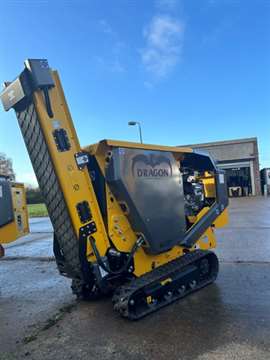 The CR400 Mini Crusher from Dragon Equipment. Photo: Dragon Equipment
The CR400 Mini Crusher from Dragon Equipment. Photo: Dragon Equipment
Compact crushing options
Modularity doesn’t only mean scale – it also means footprint. For smaller sites or restricted access jobs, contractors increasingly rely on equipment that needs minimal space and infrastructure.
Dragon Equipment’s CR series crushers, which include the CR300 Micro, CR400 Mini and the CR450 Diesel, are designed for use on restricted access and small demolition sites.
Each model’s electric control unit includes the “anti-stall” feature, which prevents jamming by automatically reversing the jaw movement on overload and halting the feed if needed to prevent engine stall.
The company says these features reduce downtime and help operators keep material flowing
Additionally, the company’s RM XSMART app includes new features such as job-based reporting from belt-scale data and condition monitoring dashboards, while its optical process monitoring system gives operators real-time visuals of material flow and machine status.
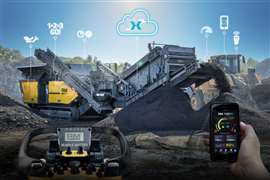 Rubble Master’s RM 90X and RM 100X crushers, and the updated RM J110X jaw unit are all equipped with hybrid drive options. PPhoto: Rubble Master
Rubble Master’s RM 90X and RM 100X crushers, and the updated RM J110X jaw unit are all equipped with hybrid drive options. PPhoto: Rubble Master
These tools are designed to reduce setup guesswork and allow quicker reconfiguration as material types change.
Adaptable screening and crushing
And it’s not just manufacturers investing in modular thinking – so are distributors. Material handling capabilities and regional responsiveness is also driving distributor strategy.
A case in point is Powerscreen of Canada, which recently marked 50 years in business, and credited much of its longevity to its ability to adapt screening and crushing packages to local conditions and customer needs.
With operations in Ontario and Alberta, and a customer base that ranges from general contractors to large recyclers, the company has built up a responsive field service and long-term supplier relationships.
The regional variability of C&D waste across Canada, including material density, climate, and regulation, continues to influence how screening systems are specified and supported in practice.
Greater capabilties
Whether through hybrid systems, new screening systems, or advanced digital tech that simplifies operation, flexibility is being increasingly baked into the modular hardware which, for contractors, means being able to do more with less.
A previous version of this article stated that ATR had invested in a CDE wet processing system for use at its Pontiac site. D&RI wishes to apologise for the confusion.
McCloskey’s expansion in Canada
Matching screen systems to site conditions is key in both product equipment development and dealer strategy. In Canada, Tyalta Industries has expanded its McCloskey dealership coverage into western and northern regions, where mobile screening systems face rough terrain, variable materials, and long travel distances between jobs.
The expansion ensures access to McCloskey’s full screening portfolio, with Tyalta providing supply, support, and servicing across British Columbia, Alberta, and the Northwest Territories.
The move reflects how dealer networks are being realigned to meet the demands of more remote and high-variability job sites.
CONNECT WITH THE TEAM







